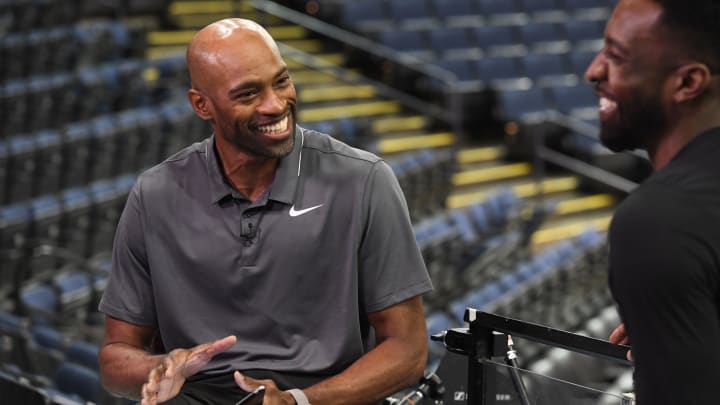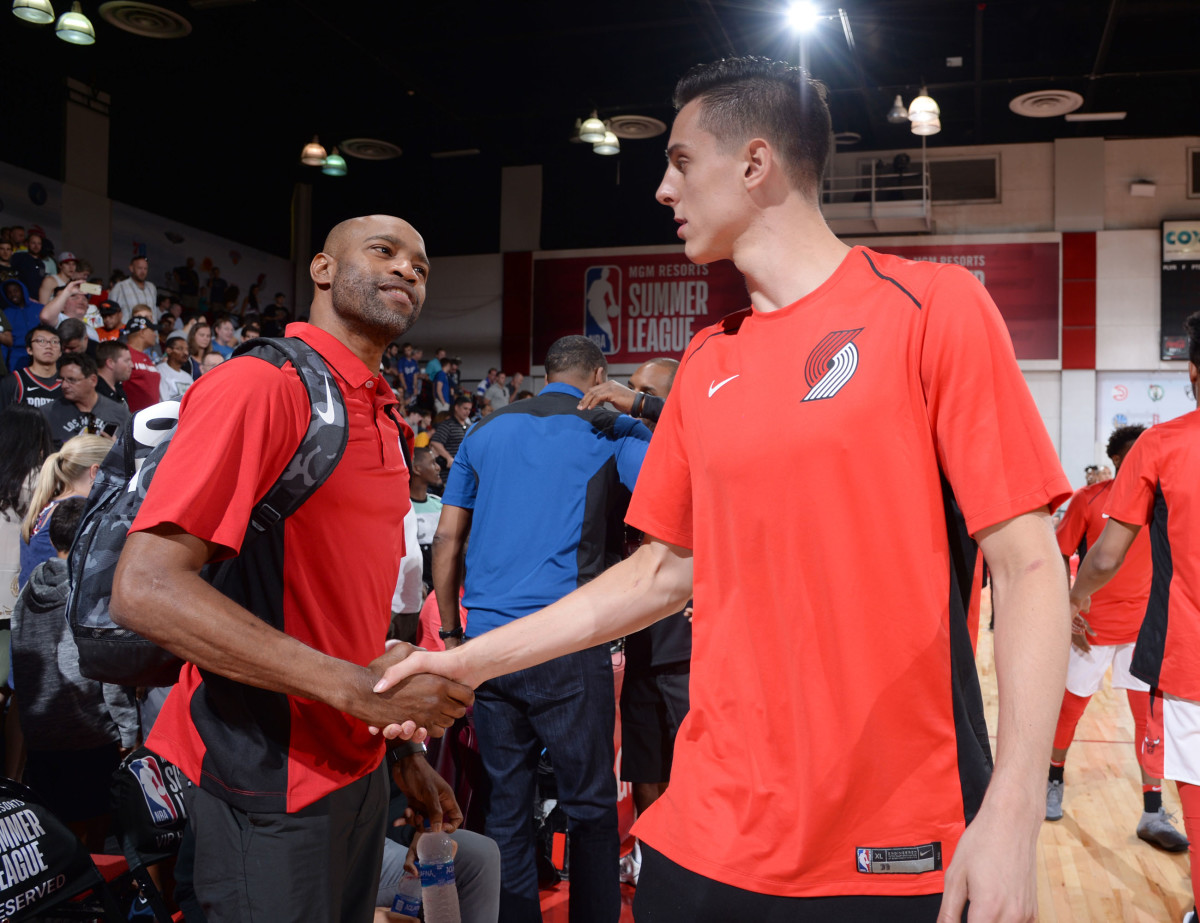Vince Carter Q&A: The Atlanta Veteran Has Perfected the Art of Aging Gracefully

Vince Carter won’t go away quietly.
The 41-year-old shooting guard, who is entering his 21st season (!!!) in the NBA this year, has perfected the art of aging gracefully. The eight-time All-Star whose out-of-the-gym athleticism earned him the nickname “Half-Man, Half-Amazing” long ago transitioned from No. 1 option to sage veteran, extending his stay in the Association.
And in case you were even the slightest bit tired of seeing Carter occasionally schooling the youth on the court, you can hear him preparing for his next career as a TV analyst on FOX Sports for the Jr. NBA World Championship. (I meant it when I said Carter wasn’t going away quietly.)
Answering the Nine Biggest 2019 NBA Draft Questions
Earlier this month, The Crossover chatted with Carter to discuss his broadcasting aspirations, how he connects with younger teammates, and more.

Rohan Nadkarni: How did you get into broadcasting?
Vince Carter: I went to Sportscaster U many years ago, developing a love for broadcasting. I’ve gotten an opportunity to do some sideline work, and some studio work with NBA TV. I’ve called some Summer League games, trying to be around for the last couple years and getting better at it. By doing so, I’ve got an opportunity to meet people in the business. When I got the opportunity to do the Jr. NBA tournament for FOX, it was a no brainer for me. And from there it’s taken a life of its own.
RN: Is it fun for you to be on the other side of things?
VC: Absolutely. It’s a different look. More so than interviewing a player or a coach, the first time walking into a locker room as a media member. You’re so used to walking off the court, walking through the tunnel, going to straight to the locker room. It’s such a different feel. Now you may go through the tunnel, but now you have to wait for media availability and all this stuff. It’s stuff you have to get used to like that.
Prediction: Kevin Durant Will Stay with the Warriors, But Draymond Green Will Go
And that’s the fun side of it. It’s exciting for me. For 20 years I’ve been doing it one way, and now I get the opportunity to be on the other side. I’ve learned a lot. And I think I can connect with players a little more than the everyday reporter can do, because I’ve been on the other side as a basketball player.
RN: You’re the best example of how to handle the later years of your career. How did you know it was the time to make the switch from 20-point scorer to role player? How did you make that switch?
VC: I mean, it’s right there in front of you. It’s not a guessing game. It’s more so, can you accept it? And can you prepare yourself for the next phase? I was able to do that. And on the flip side, me personally, I have no fear of not having something to do when I’m finished playing. So, to make sure that doesn’t happen, I started years ago with broadcasting, networking, just talking to people with my different interests and passions. Making it happen, making it come to life. It’s really worked out for me.
The NBA and the players’ association has done a great job of opening avenues for life after basketball. For us as players sometimes, it’s tough to consider it because you’re so engaged and locked in your career. That opportunity, like you said, to be a 20-point scorer. But it quickly changes. There are a lot of guys who don’t have to worry about that. Even if I’m still a 20-point scorer, at some point it comes to an end. I want to make sure I prepare for phase two.

RN: A lot of older guys don’t really seem to accept how the game has changed with the emphasis on three-point shooting and maybe centers not being as important. You’ve played across eras, how do you feel about how the game changed in that time?
VC: I think the center is important, because what it does offensively—getting into that coaching side—offensively, it’s a different game, the center can open the floor even more. Even as the game was changing to more three-point shooting, you’d still have a big man in the paint. It wasn’t as open as teams wanted it to be.
But now when you get the center who can shoot the three-point shot, or even out of the paint at 19 feet or so, it opens the paint and creates those driving lanes. We’ve seen Houston and Golden State do it. You want the center to be a “stretch five” now. When I was growing up, if you were a center you’d work in the post. Now you see those guys are in the small forward line working on shooting. That’s what the game has become now.
LeBron James’s Best Response to Donald Trump Was None At All
RN: So there were stories going around about how Trae Young wasn’t born when you entered the league. How do you connect with the young guys you’ve played with the last couple years? Are you playing Fortnite with them?
VC: I’m going to sound like a parent when I say this: I’ve taken the time to learn their likes and dislikes. And then I deal from there. I don’t particularly play video games, and they weren’t like this in my age anyway. I can have a small conversation about things that pique their interest. We have that conversation about how the game was like back in my day. Trae Young, like you said wasn’t born yet, or the reality of how his dad is only like a year older than me. [Laughs] That’s the conversation and we can go from there.
